Iranian Americans Protest Against Raisi Outside The UN In NY
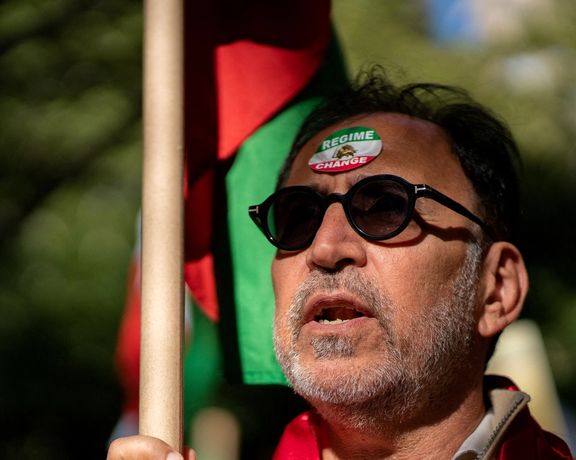
Iran’s President Ebrahim Raisi delivered his debut speech at the UN General Assembly on Wednesday as some American Iranians protested his presence on US soil.

Iran’s President Ebrahim Raisi delivered his debut speech at the UN General Assembly on Wednesday as some American Iranians protested his presence on US soil.
Large crowds of people rallied outside the United Nations headquarters as Raisi was addressing world leaders during the 77th United Nations General Assembly summit.
"We are here to protest against the criminal mass murderer Raisi, the so-called president of Iran, who was appointed by the Supreme Leader,” said one of the protesters, adding that “He killed, he's part of that death squad in 1988 which executed 30,000 political prisoners in Iran," referring to the killing of political prisoners who were serving their prison sentences 34 years ago.
During his speech, Raisi raised the picture of Qasem Soleimani, the Iranian Revolutionary Guard’s Quds Force Commander who was killed al n a US drone airstrike outside Baghdad International Airport in 2020, Raisi, however, did not mention the death of Mahsa Amini who was killed in the custody of Iran’s hijab enforcement police, triggering nationwide protests.
Speaking shortly after Raisi at the Assembly, US President Joe Biden reiterated his willingness to revive the deal that former president Trump had abandoned in 2018, prompting Iran to begin violating its nuclear limitations, instigating fears that Tehran may be seeking to obtain an atomic weapon.
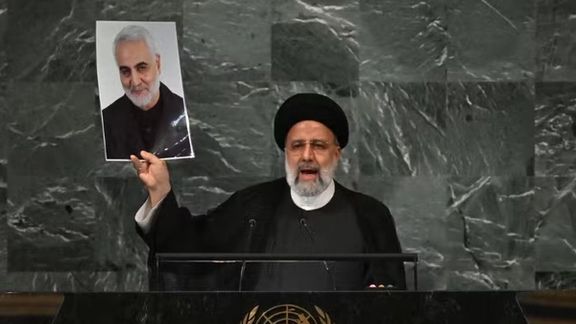
Former US President Donald Trump should face trial for ordering the killing of Qasem Soleimani in 2020, Iran’s president told the UN General Assembly in New York.
Ebrahim Raisi, who is sanctioned by the United States for human rights violations, obtained a visa to attend the UN annual meeting despite opposition by US lawmakers and Iranian dissidents.
During his speech he waved a photo of Soleimani and described him as a hero for many in the Middle East and a figure who defeated the Islamic State group.
Soleimani was killed on January 3, 2020, by a US drone strike ordered by former President Donald Trump who described him as a terror threat against his country and others in the region. Iran vowed revenge for his death, threatening former Trump administration officials. US law enforcement has confirmed that active threats exist against former Secretary of State Mile Pompeo and former National Security Adviser John Bolton.
In his first in-person address to the world body, the hardliner president elected last year struck a defiant and at times bombastic tone, demanding that the United States should provide guarantees that it will not withdraw from a new nuclear deal if one is ever reached.
Raisi also tried to portray the Islamic Republic as a democratic political system where justice prevails, as tens of thousands of protesters have been demonstrating in more than 40 cities and towns in Iran this week, rejecting the clerical regime.
The protests began after a 22-year-old woman was detained in the street by a hijab enforcement patrol and two hours later was delivered to a hospital in coma. She died on Friday for severe head trauma. As hospital staff confirmed to Iran International over the weekend.
Iran has been engaged in indirect talks with US since April 2021 to restore the Obama era nuclear accord known as the JCPOA. In mid-August there were strong hopes among diplomats that the sides had reached a compromise, but then Tehran presented new demands that Washington rejected, and the talks are currently deadlocked.
Raisi has rejected the idea of meeting or speaking with President Joe Biden while in New York, as Iran has refused all direct contacts with the United States during the nuclear talks.
While Raisi has admitted to have been part of a ‘death commission’ that ordered the killing of up to 5,000 political prisoners in Iranian jails in 1988, he claimed in his speech that the Islamic Republic is a champion of human rights and criticized Western countries, including Canada for violations.
"The Islamic Republic of Iran rejects some of the double standards of some governments vis-a-vis human rights," Raisi said. "(So long as) we have this double standard where attention is solely focused on one side and not all equally, we will not have true justice and fairness.
For decades, Iran has not allowed any UN human rights rapporteur to visit the country for an independent assessment of the situation after numerous reports and criticisms expressed by rights defenders of gross violations.

The US Treasury Department has said satellite internet equipment are not under Washington’s sanctions and can be exported to Iran.
The Treasury made the comment in reaction to a tweet by SpaceX CEO Elon Musk, suggesting that a license is not needed to provide the firm's Starlink satellite broadband service in the country.
Some people on Twitter had asked Musk to provide the satellite-based internet stations as he did for the people of Ukraine after the Russian invasion. However, most Ukrainians have not been able to access the internet via Starlink because it needs special equipment and is somehow too complicated to set up. Also, the Iranian government would allow any equipment intended for circumventing its internet censorship to enter the country.
The Treasury Department's Office of Foreign Assets Control (OFAC) has a longstanding license that "authorizes certain exports to Iran of hardware, software, and services related to communications over the internet, including certain consumer-grade Internet connectivity services and residential consumer satellite terminals authorized under General License D-1," a department spokesperson said, without specifying whether the license would apply to Musk's plans.
On Monday, Musk said that his company will ask for an exemption from US sanctions to provide Internet access for Iranians as the country is engulfed in widespread protests over the death of a young woman in the custody of hijab enforcement patrols.
Since protests over the death of Mahsa Amini have started, internet connection was significantly slowed down, a strategy the government usually uses during protests to prevent news of unrest reaching the rest of the country and abroad.
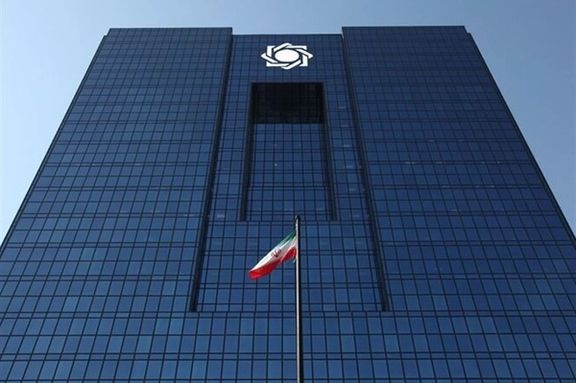
An Iranian hacktivist group says it has started its cyber operations against the Islamic Republic in solidarity with the ongoing protests across Iran over the death of a hijab victim.
On Tuesday and Wednesday some state-owned websites, including the website of the Central Bank of Iran, were targeted by hackers claiming to be from the ‘Anonymous’ hacking group. A member of the group posted a message to the Iranians on Twitter on Tuesday, saying, "We are here with you. The operations against Iran began. wait for us."
At least two main websites of the Iranian government and some state-affiliated media webs as well as the state broadcaster IRIB were among the targets, some of whom were back on line after a few hours. One of the websites of the government hosts “smart services” and another is dedicated to publishing government news and interviews with officials.
“All database has been deleted,” claimed a social media account believed to be affiliated with Anonymous.
A video was also released early on Wednesday showing footage of protests in several Iranian cities that have erupted since Mahsa Amini died in custody of the hijab enforcement patrols. “This was the last straw,” an altered voice on the video said of Amini’s death. “The Iranian people are not alone”.
Following large anti-government protests in Tehran and Amini’s hometown as well as a couple of other cities in the Kurdistan province, demonstrations expanded Tuesday to many Iranian cities and towns, with gunshots reported.
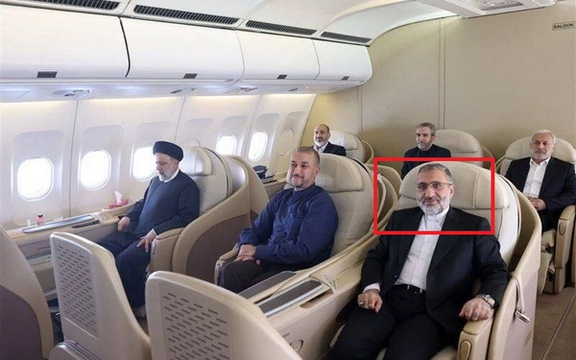
The chief of staff of Iran’s president, who is under sanctions by the European Union like Ebrahim Raisi himself, is accompanying the hardliner president on his trip to New York.
He was first blacklisted in 2011 as Iran’s prisons’ organization chief over “serious human rights violations.”
Gholam-Hossein Esmaili is sanctioned over his "complicity in the massive detention of political protesters and covering up abuses performed in the jailing system."
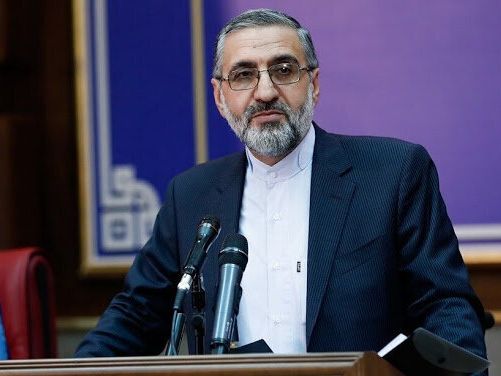
He was the spokesman of the Judiciary of the Islamic Republic from 2019 until 2021, and served as Tehran Province’s chief justice from April 2014 until August 2019. The former prosecutor was appointed as the head of president’s office on August 8, 2021, the same day Raisi also named Mohammad Mokhber, the chairman of the powerful state-owned foundation sanctioned by the United States.
Raisi – who is himself on US and European sanctions list – is currently in the US along with a large entourage to attend the UN Assembly, despite heavy pressure on the Biden administration to deny a visa for him.
Raisi served as Iran’s Judiciary chief before becoming president in August 2021, but he spent most of life in the Islamic judiciary and is accused by human rights groups of taking part in gross violations of human rights. He was a member of a death committee that ordered the killing of thousands of political prisoners in 1988, an involvement he has proudly admitted.
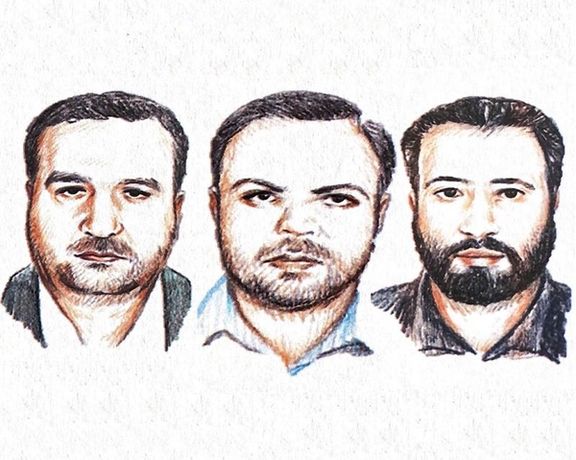
Iran International has obtained information about the specific targets of the latest Israeli air strike on Tehran-linked targets in Syria.
Israel carried out airstrikes on Syria's Damascus International airport and other positions south of the capital on late Friday and early Saturday, September 16 and 17, targeting what is called 'Unit 2250' -- a special Iranian logistics institution run by Tehran’s Revolutionary Guard.
Established as a subset of Unit 2000, the outfit is headquartered in Damascus with many offices across Syria such as the suburbs of the capital as well as Latakia, Hama, Aleppo and Deir ez-Zor.
The unit is in charge of receiving incoming equipment, weapons and personnel from Iran as well as supporting the Iran-backed Lebanese forces in the country. It is also tasked with escorting and hosting senior Iranian officials and their families upon arrival in Syria, which are usually carried out in coordination with senior Syrian authorities.
In the recent attack the warehouses, parking lots and even the main office were targeted by Israeli strikes. “The aggression led to the death of five soldiers and some material damage,” Syria’s official news agency SANA quoted a military source as saying.
According to exclusive information received by Iran International, the unit is under the direction of someone identified only as ‘Seyyed Reza’ while two other employees of the office are identified as Abdollah Ebadi and Meysam Katbi.
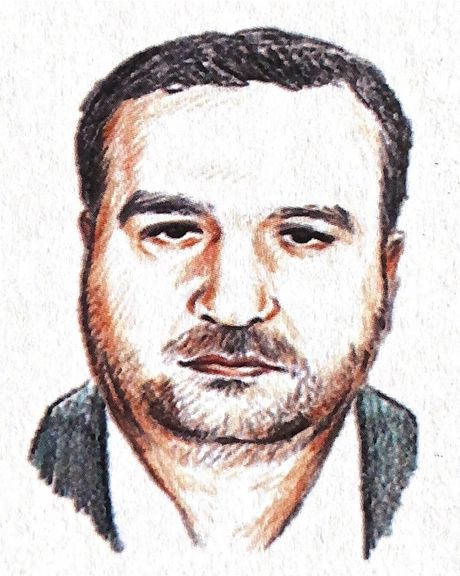
Seyyed Reza is the head of the office in the Damascus branch and has for many years been an a key Iranian asset for its activities in the region. He had earlier worked as the representative of the unit in Tehran for several years.
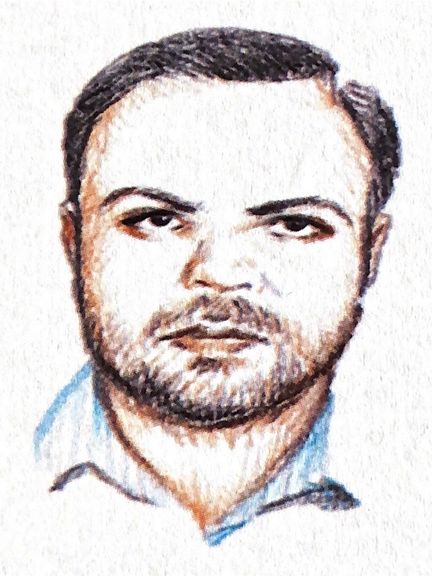
Abdallah Ebadi is one of the senior members of the unit who is in charge of transferring weapons through passenger flights, mainly through delivery of hand luggage from Iran to Syria.
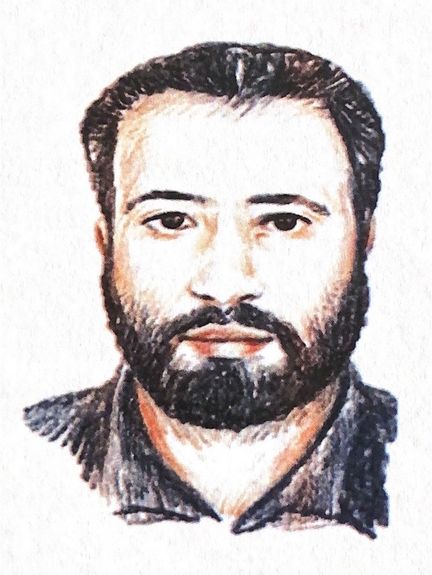
Meysam Katabi is responsible for the transfer of personnel as well as weapons between Iran and Syria. He used to serve in a similar post in the 190th unit of the Quds (Qods) Force, the extra-territorial arm of Iran’s Revolutionary Guard.
Israel has intensified strikes on Syrian airports to disrupt Iran's increasing use of aerial supply lines to deliver arms to allies in Syria and Lebanon including Hezbollah, regional diplomatic and intelligence sources told Reuters.
Tehran has adopted air transport as a more reliable means of ferrying military equipment to its forces and allied fighters in Syria, following disruptions to ground transfers.
A senior Israel Defense Forces officer said on Thursday that Hezbollah and other Iran-backed militia groups are withdrawing from areas in Syria that have been targeted by Israel. The apparent withdrawal of these forces from some regions is “a result of the IDF strikes” in recent weeks. He did not say which parts of Syria he was referring to.
Israel has been targeting Iranian weapons supplies since 2017 to prevent Tehran from expanding its foothold in Syria and transferring more weapons to its proxy forces.